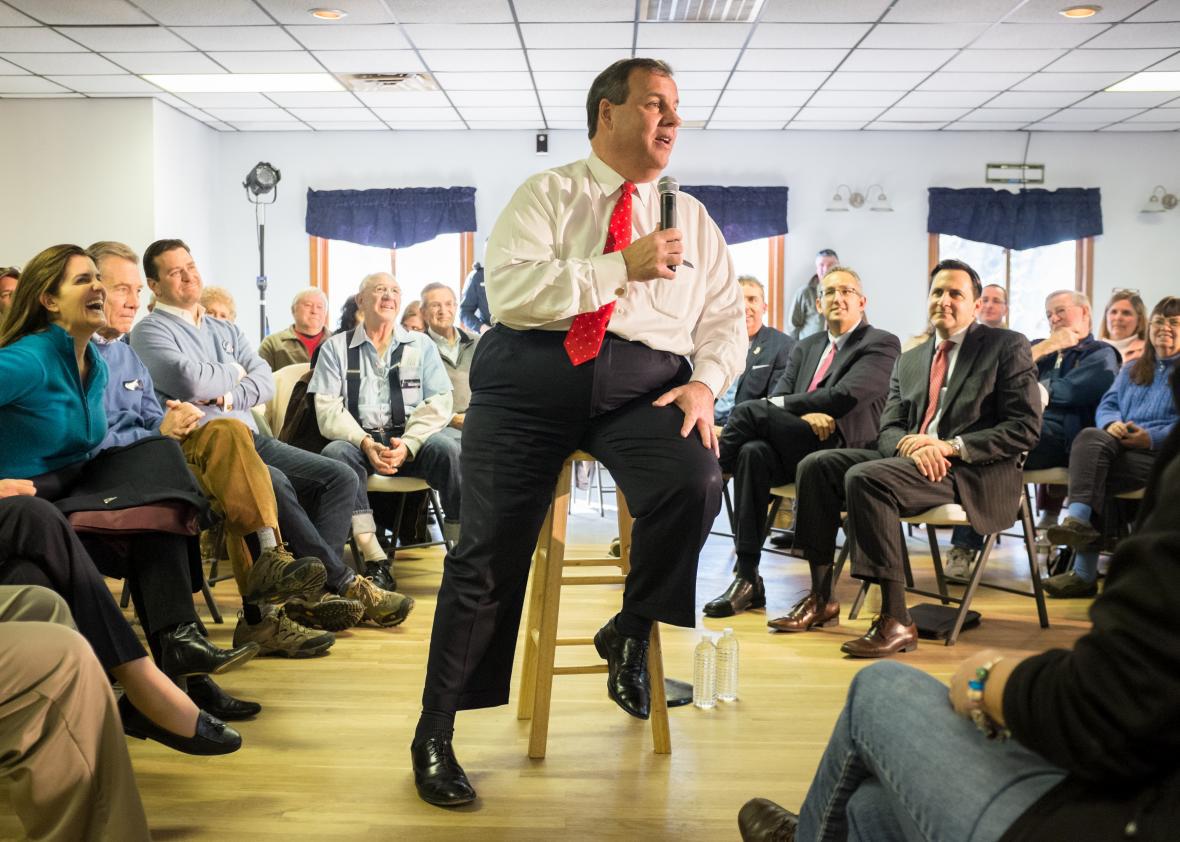On Wednesday, Chris Christie is expected to make official what became obvious the moment he told supporters at his New Hampshire defeat party the night before that he was going home “to take a deep breath“: He’s dropping out of the race.
The New Jersey governor bet big on New Hampshire and lost. With 94 percent of the state’s precincts reporting, Christie is sitting in sixth place with 7.5 percent of the vote—roughly a fifth of Donald Trump’s first-place haul. Compared with his establishment rivals, meanwhile, Christie fared even worse. He finished fourth out of four, behind Kasich (with less than half the Ohio governor’s second-place vote total), Jeb Bush, and Marco Rubio, a man he thoroughly embarrassed on the national stage only three days before.
In the runup to New Hampshire, Christie made a big show of his determination to soldier on in the race regardless of the night’s outcome, but few believed he would or that he even could given how little money he had in the bank to begin the year. He’ll become the ninth Republican hopeful to lose all hope, joining: Scott Walker, Bobby Jindal, Rick Perry, Lindsey Graham, George Pataki, Mike Huckabee, Rick Santorum, and Rand Paul.
In a vacuum, Christie’s departure would be easy to ignore. He placed 10th in last week’s Iowa caucus and sixth in this week’s New Hampshire primary—and is currently polling at about 2 percent in South Carolina, which will hold the next GOP nominating contest on Feb. 20. Still, given the current dynamics of the race, the New Jersey Republican will have one more chance to impact the contest in a way he was unable to when he was still in it: He could endorse one of his former establishment-minded rivals.
The impact of endorsements is hard to quantify, and there’s no guarantee that Christie’s (relatively few) supporters and donors would follow him to a new campaign. But such a decision would pack considerably more punch than a normal one since many would see it as evidence that the Republican establishment was finally starting to coalesce around a single candidate. Christie, of course, does not speak for the entire GOP establishment—if he did, he’d still be in the race!—but perceived momentum can become actual momentum in politics, particularly at a moment when the battle between Rubio, Bush, and Kasich is so muddled. (As the debates have shown, Christie would also be an effective surrogate on the stump.)
Christie’s problem, though, is that he doesn’t have anywhere obvious to turn. Rubio remains the best positioned in the establishment lane, almost by default. But it’s hard to imagine that Christie could turn around and back Rubio after battering him so hard on Saturday’s debate stage that the Florida senator got stuck on repeat. That leaves Kasich and Bush as his only real options. Both, like Christie, served as governor, and both, like Christie, are far closer to the center than Rubio. But Kasich appears comically ill equipped to unite conservatives given his proud conservative apostasy on topics like immigration, Obamacare, and Common Core, and Bush got a prolonged tryout this past fall and failed spectacularly to win the job. Christie, then, is left in the same position as the rest of the Republican Party: He’s ready to choose but has no good choice.
Additional Slate coverage of the New Hampshire primary:
- Kasich’s Second-Place Finish Is a Nightmare for the GOP
- Why Bernie Sanders’ Victory Is a Really Big Deal
- Donald Trump Won New Hampshire. Sad!
- Hillary to Voters After Losing: Let’s Get Real, America
Read more of Slate’s coverage of the GOP primary.
